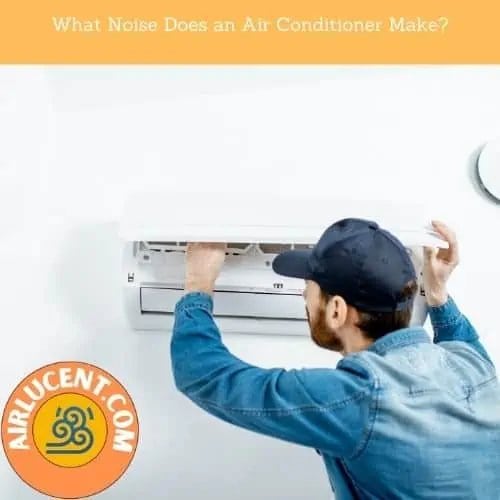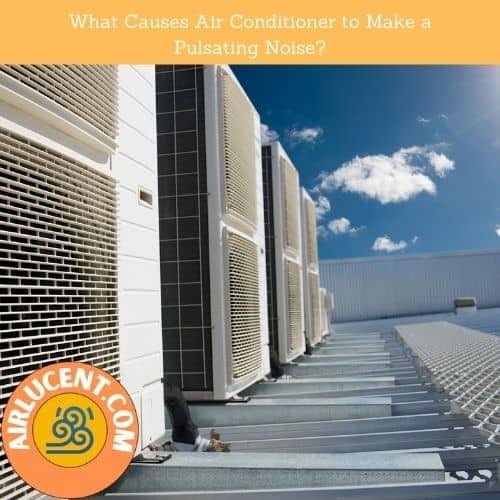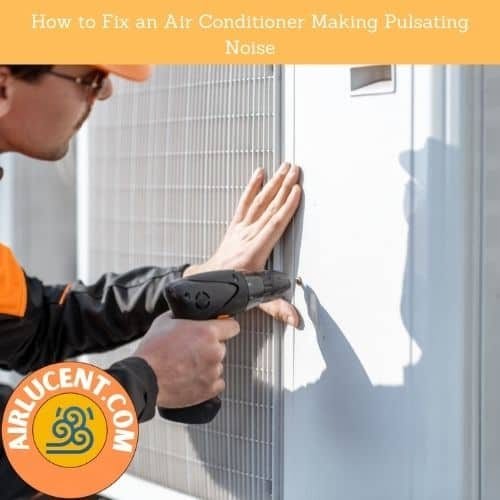Share This Guide
Like other electronics in your house, your air conditioner can start making abnormal sounds. These sounds range from gurgling to loud popping noises, indicating a severe problem with the AC. But, what if it starts making the rhythmic pulsating noise? Pulsating noises are abnormal and should warrant a professional to check your unit.
When your AC makes a pulsating noise, it alternates from loud to soft sounds when working. These alternating sounds may have a rhythm similar to a pulse at times. These pulses may indicate a minor issue that you can quickly fix. However, pulsating noises can also be caused by a major mechanical problem that requires a professional to correct.
This article will help you understand the causes and fixes of your AC making pulsating noises. You will also discover the causes of other unusual AC noises like loud popping noises.
What Noise Does an Air Conditioner Make?

When you start your air conditioner, it produces an “airplane take-off” sound since the moving parts have started functioning. After running for a few seconds, the sound similar to an airplane taking off disappears.
As the AC blows air to cool off your house, it produces a steady and gentle blowing noise. It is normal to hear the AC making some clicking noises that indicate the completion of a cooling cycle.
The noises mentioned above indicate a well-performing air conditioner. However, it is advisable to check the AC unit regularly to ensure everything is okay. If your AC makes other noises such as continuous clicking, banging, buzzing, gurgling, rattling, etc., you should check it immediately. If you don’t have the tools or skills to repair the AC, contact an HVAC specialist for help.
What Causes Air Conditioner to Make a Pulsating Noise?

When you hear pulsating noises from your air con, it may indicate a malfunction. These pulsating noises may be caused by:
1. Loose Refrigerant Line
When the refrigerant line lacks sound-dampening insulation, it touches the wall. This leads to pulsating noises when the refrigerator line wobble and rubs against the wall.
2. Malfunctioning Blower Motor
If the blower motor in your air-con starts to malfunction, it may cause the conditioner to produce pulsating noises. The malfunction may be major or caused by loose wires that make the motor not work correctly.
3. Damaged Parts
When fan motor parts become damaged or broken, they produce a pulsating noise after switching on the air conditioner. More so, if the motor’s blower is damaged, the condenser system will produce noises.
4. Loose Parts
The vibrations of a working air conditioner may cause some parts such as motor bearings or connecting belts to loosen. Other parts that can loosen or break include the fan motor, fan blade, and blower wheel. These loose parts will produce unusual pulsating noises.
5. Plastic Pad Sounds
If your air conditioner uses a plastic pad, the motions of the compressor may make the plastic pad produce pulses.
6. Dirty Air Filter
The air filter should be dust-free for your air conditioner to function correctly. When the air filter is dirty, it makes the motor overwork. The overworking motor may produce sounds that come out as pulsating noises.
How to Fix an Air Conditioner Making Pulsating Noise

Having known the causes of an air conditioner making pulsating noises, let’s now focus on ways to fix your air conditioner. It is imperative to note that professionals should do some fixes since they require specialized skills.
Here are some of the fixes to a pulsating air conditioner:
1. Fixing or Replacing Loose Parts
The air conditioner may break as time goes by, or some parts become loose due to continuous vibrations. To minimize noise, fix the parts or replace them if they are beyond repair.
2. Cleaning the Air Filter
Your AC’s air filter may clog up with debris and dirt, which will cause malfunctioning and noises. Clean the dirt and debris and leave the filter clean. You should replace air filters regularly for the best results.
3. Insulating the Refrigerator Line
As we mentioned, the air conditioner makes noise when it rubs against the wall. To curb this noise, place the refrigerator line inches off the wall. Next, place rubber insulation or foam between the wall and the line to ensure they don’t touch.
4. Contacting HVAC Professionals
The best approach to fixing your air conditioner is to contact HVAC specialists. They will check your air conditioner while minimizing the potential AC hazards. For instance, if you mishandle and inhale refrigerant lines, it could deprive oxygen of your vital body organs. More so, loose wires can cause electric shock.
Contact a repair pro to check and repair the device for you rather than risking your safety or damaging your air-con even further.
Other Types of Noises from an Air Conditions and their Causes
Besides making pulsating noises, your air conditioner may produce the following noises:
Buzzing Noise
The leading causes of buzzing noises in your air conditioner are malfunctioning motor and capacitor. However, the buzzing noise can also be caused by:
- Loose or broken parts, e.g., loose fan blades
- The air con becomes frozen
- Electrical issues
- Dirty condenser coil
Surging Sound
The electrical components are the leading causes of sound surging in the air conditioner. If there is a malfunction in electrical wiring, it can cause short circuits or significant damage. These issues cause surging sounds.
Gurgling Noise
Refrigerator leaks usually cause bubbling or gurgling noise. Due to poor sealing, the refrigerant can leak and trap air which will cause bubbling as air passes through the unit. It can be safe to use your AC when producing gurgling noises, but a professional should first check it.
Loud Popping Noise
If the AC’s sensors malfunction or fail to drain correctly, it can lead to ice forming inside it, which causes a loud popping noise. More so, if the AC has water inside (frozen or unfrozen), it will produce unusual sounds. This moisture can cause more damage if it contacts more sensitive AC parts.
Screeching or Squealing
If your unit has faulty bearings or belts, it can make screeching sounds. Additionally, a worn-out fan motor or blower wheel may make noise. You should lubricate the moving parts or replace worn-out parts to curb the noise.
However, if internal pressure builds to dangerous levels, the unit will produce a high-pitched squeal. Treat this as an emergency, quickly turn off the AC, and contact an HVAC specialist.
Whistling
The air conditioner makes whistling noises if there is low airflow. Low airflow might be caused by dirty air filters and blocked air vents. Damaged seals can also cause whistles.
Conclusion
Air conditioners are among the must-have electrical appliances in our homes and offices. Maintaining them will mean cooler temperatures and high durability. Always listen to the sounds the unit makes to determine if it has issues. More so, have a specialist regularly carry out maintenance checks to your unit to prevent issues before they occur.
HVAC tech with over 30 years of experience. Retired and doing repair work on the side around Madison County, AL.